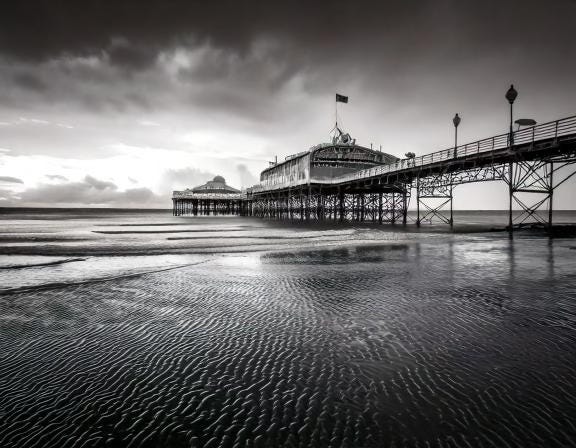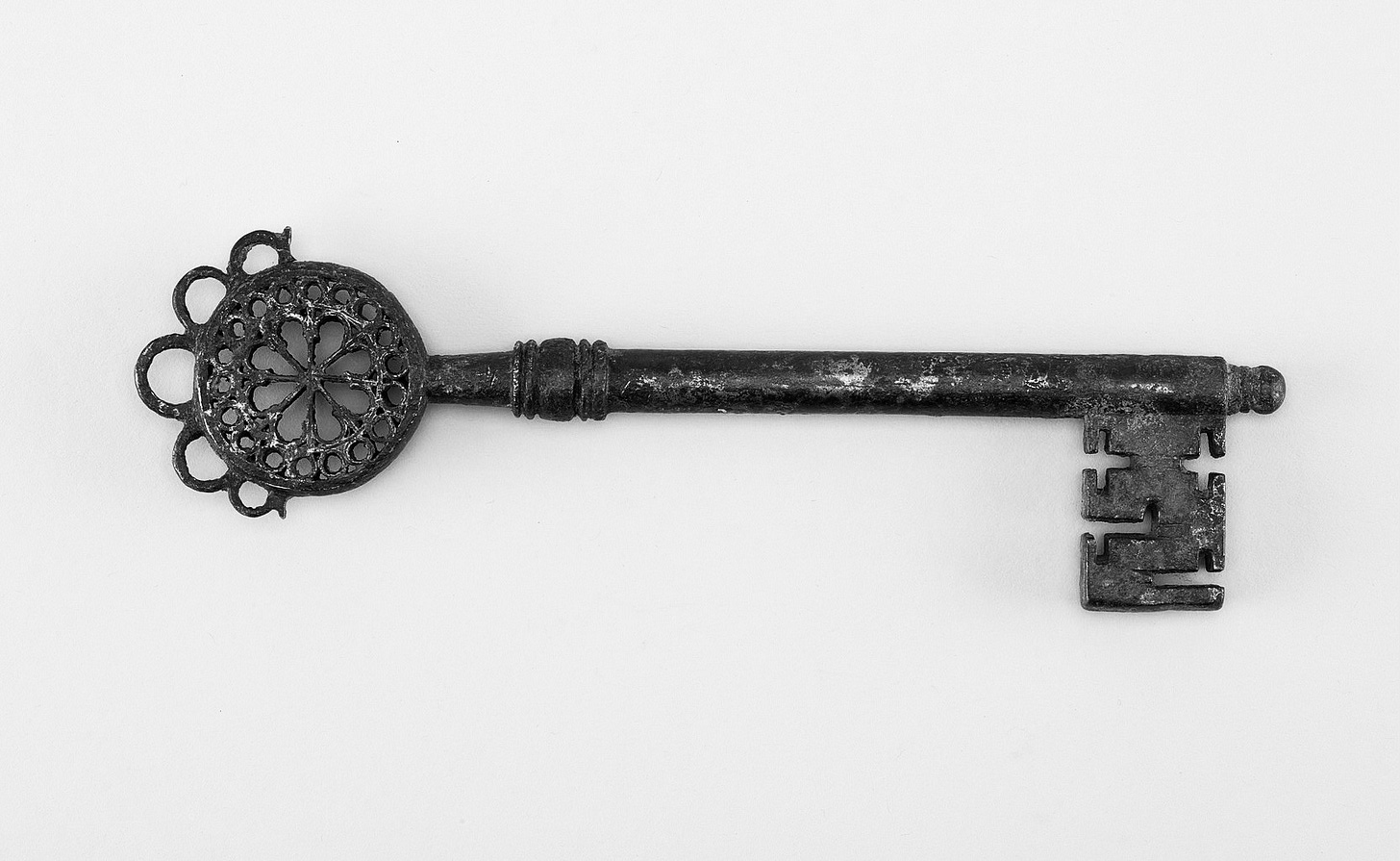"The man who bought a pier" - 2
The second extract from my w-i-p (aka 'unfinished novel')...
You can read the first section here:
One (continued)
Finding West Beach proved easy enough. Deciding to forego the museum for a little while, he walked to the entrance of the car park and then headed in a direction that seemed to be generally downhill. There was a convenience store at the next junction. It was a run-down place. Two of the letters had fallen off the store’s name so the word didn’t make sense — it said “Co n r” rather than “Corner”. It might have been his own surname, Connor, hiding there. An ancient-looking bubble-gum machine stood forlornly on the pavement, chained to the wall. It was empty. He stopped a woman who was just going inside to ask directions.
“West Beach?” she checked, looking at him slightly oddly from beneath a fraying wooly hat. It was hardly the time of year or the weather to be heading for the sea. She pointed into the near distance. “See those traffic lights? Left there and then follow the road. There’s a fork; the right-hand side takes you back into town, the left down to West Beach.” He struggled with the prospect of going back into town because as far as he could see he’d not actually been in it yet. Still, he thanked her and walked on.
The fork was about another two-hundred yards beyond the lights. If the right-hand turn did take you ‘back into town’ then it seemed a very uninspiring prospect; clumps of squat terraced houses and little else. The other fork turned gradually to the left before a bend almost at right angles, after which the road dropped down dramatically towards the beach and sea, both suddenly clearly visible. He wondered how he had been unable to glimpse the water from further up the hill, pausing for a moment to try and orient himself with the lights, the convenience store and the geography of the place. Instinct told him that its elevation should have permitted him at least a glimpse of the sea from back there — potentially from the Auction House carpark too. But it hadn’t, and there seemed no point in worrying about it now. As he walked quickly onwards, propelled by the gradient more than his own curiosity, he felt the keys in his right-hand trouser pocket, fingers gently playing with them.
When the road levelled out, it turned sharply left again and appeared to follow the track of the sea until the bay petered out. From here, the water looked sombre and uninviting, a dark grey filled with menace, the wind that chased itself towards him harsh and threatening. Across the narrow cracked pavement was a small area of coarsely tarmac’d ground and a roughly made ramp leading to it. Nearby, a two metre metal post, leaning slightly as if bracing itself against the wind, was adorned with a small weather-worn sign. ‘Private parking’ it said. He wondered who would want to park there, a forlorn spot on the edge of a meagre pebble beach that sloped a little too sharply down to the edge of the water — and to the pier.
If West Beach was uninspiring — a shallow and narrow rump of terrain as far from the traditional image of a seaside holiday spot as it was possible to get — the pier was completely the reverse. Turn the clock back forty years or more and it was easy to imagine it thronged with people, the air filled with laughter and shouts, children with inflatable balls, balloons and ice creams, adults walking arm-in-arm. A little way onto the beach, a broad sweep of pale stone-coloured concrete steps rose gradually in an arc leading to the entrance to the pier, elaborate and ornate ironwork housing two pairs of large gates which, from where he stood, he could see were chained closed. He juggled the keys in his pocket once again. After a little while, and as soon as the decking of their pier was high enough to be out of reach from the beach below, the tall fencing that adjoined the entrance gates gave way to a lower, more traditional kind of railing. His eyes traced along this, estimating the distance to the end of the construction. It was probably about a quarter of a mile. At its far end, a large building of uncertain depth stood proud and slightly disproportionate in relation to its surroundings. It had clearly been white or off-white once, and he could see traces of reds and blues and yellows, shadows of the past stealing through the flaking and peeling overcoat of drabness. Still intact, bold but tarnished lettering proclaimed ‘West Beach Pier’ above three sets of partly glazed doors painted a now-dull burgundy colour. It was bizarre to imagine that, for a mere pound, all this was his.
Strangely resonant, the pebbles crunched under his feet as he made his way to the foot of the steps. He glanced left and right before venturing further. The beach was deserted except for someone walking their dog the far distance. Close up, the concrete had something of a green tinge to the lower steps, residue from the occasional spring ebb tides, and which had not been swept clean in years. Here and there the edges of the treads had lost any semblance of their original clean lines, partially crumbled where they had been unable to offer any further resistance to the sea and the weather. It was only when he reached the top step and looked back down them that he began to wonder if they were entirely safe.
He rattled the pair of gates immediately before him, not because he expected them to open, but rather to hear the noise they made, the chain tensing and relaxing against them. Perhaps he had expected the exercise to tell him something about how solid or secure they were, as if doing so might act as a rudimentary MOT on the whole structure. Beyond the gates, the boards that made up the surface of the pier appeared solid enough, their uniform grey-brown colouring giving little away. He looked for any obvious gaps but could see none. Beyond the gates, the railings nearest him were intact. He had expected to see one or two flaws with either uprights or cross-members missing, but from his initial survey he could find none. They were unloved certainly, but did not appear deficient. He took a step back, wondering if there were any warning signs in place. Anticipating seeing something proclaiming danger as a result of the entire structure’s fragility, he found only one small notice attached to the gates themselves: ‘Private Property’ it said, then ‘Trespassers will be…’ — but the remainder of the lettering, which was not embossed, had long since vanished.
The thick chain that secured the gates was adorned with a heavy metal padlock. There was a sliding seal over the keyhole which moved to the side easily enough. He took the keys from his pocket and started comparing them with the lock; of the nine keys he had, each varying in scale, it was immediately obvious that the largest of them was the only contender for this particular job. He paid scant attention to the others. The big key slipped in without effort and, with a smoothness that surprised him, sprung the clasp. He checked his watch. All he had to do now was to free the chain and then he could simply walk through the gates and onto the pier. His pier. But it was getting late. Indeed, it was much later than he had anticipated, and glancing to the west, saw the sun already low in the sky. Turning the key clockwise, he re-engaged the lock. He would come back in the morning and leave his car in the ‘private parking’ space now undoubtedly reserved for him. There would be more time to explore the following day, and he could come better prepared, perhaps with a torch to enable him to investigate the main structure ahead of him which, he was certain, was bound to be without electricity.






